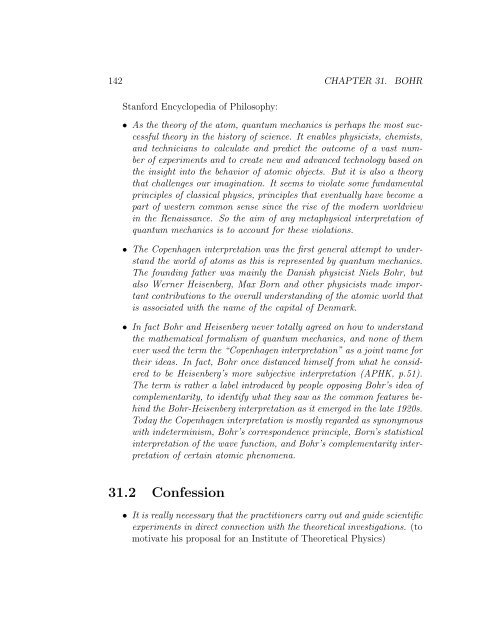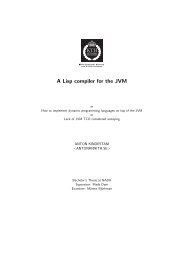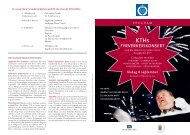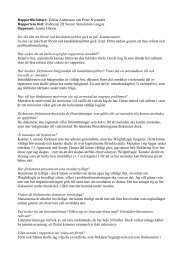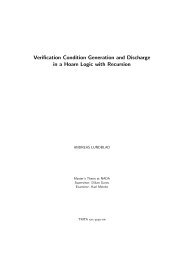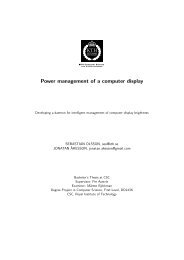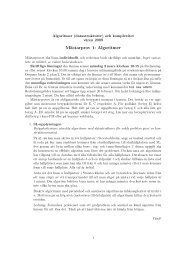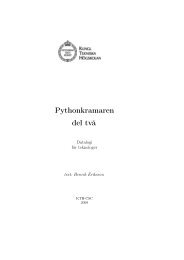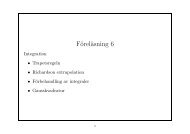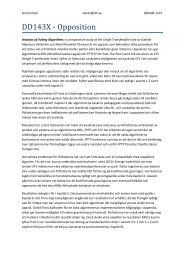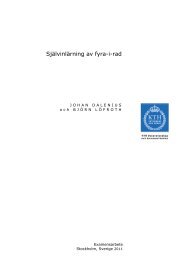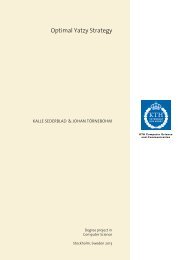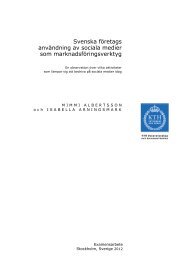Dr Faustus of Modern Physics - Department of Speech, Music and ...
Dr Faustus of Modern Physics - Department of Speech, Music and ...
Dr Faustus of Modern Physics - Department of Speech, Music and ...
You also want an ePaper? Increase the reach of your titles
YUMPU automatically turns print PDFs into web optimized ePapers that Google loves.
142 CHAPTER 31. BOHR<br />
Stanford Encyclopedia <strong>of</strong> Philosophy:<br />
• As the theory <strong>of</strong> the atom, quantum mechanics is perhaps the most successful<br />
theory in the history <strong>of</strong> science. It enables physicists, chemists,<br />
<strong>and</strong> technicians to calculate <strong>and</strong> predict the outcome <strong>of</strong> a vast number<br />
<strong>of</strong> experiments <strong>and</strong> to create new <strong>and</strong> advanced technology based on<br />
the insight into the behavior <strong>of</strong> atomic objects. But it is also a theory<br />
that challenges our imagination. It seems to violate some fundamental<br />
principles <strong>of</strong> classical physics, principles that eventually have become a<br />
part <strong>of</strong> western common sense since the rise <strong>of</strong> the modern worldview<br />
in the Renaissance. So the aim <strong>of</strong> any metaphysical interpretation <strong>of</strong><br />
quantum mechanics is to account for these violations.<br />
• The Copenhagen interpretation was the first general attempt to underst<strong>and</strong><br />
the world <strong>of</strong> atoms as this is represented by quantum mechanics.<br />
The founding father was mainly the Danish physicist Niels Bohr, but<br />
also Werner Heisenberg, Max Born <strong>and</strong> other physicists made important<br />
contributions to the overall underst<strong>and</strong>ing <strong>of</strong> the atomic world that<br />
is associated with the name <strong>of</strong> the capital <strong>of</strong> Denmark.<br />
• In fact Bohr <strong>and</strong> Heisenberg never totally agreed on how to underst<strong>and</strong><br />
the mathematical formalism <strong>of</strong> quantum mechanics, <strong>and</strong> none <strong>of</strong> them<br />
ever used the term the “Copenhagen interpretation” as a joint name for<br />
their ideas. In fact, Bohr once distanced himself from what he considered<br />
to be Heisenberg’s more subjective interpretation (APHK, p.51).<br />
The term is rather a label introduced by people opposing Bohr’s idea <strong>of</strong><br />
complementarity, to identify what they saw as the common features behind<br />
the Bohr-Heisenberg interpretation as it emerged in the late 1920s.<br />
Today the Copenhagen interpretation is mostly regarded as synonymous<br />
with indeterminism, Bohr’s correspondence principle, Born’s statistical<br />
interpretation <strong>of</strong> the wave function, <strong>and</strong> Bohr’s complementarity interpretation<br />
<strong>of</strong> certain atomic phenomena.<br />
31.2 Confession<br />
• It is really necessary that the practitioners carry out <strong>and</strong> guide scientific<br />
experiments in direct connection with the theoretical investigations. (to<br />
motivate his proposal for an Institute <strong>of</strong> Theoretical <strong>Physics</strong>)


